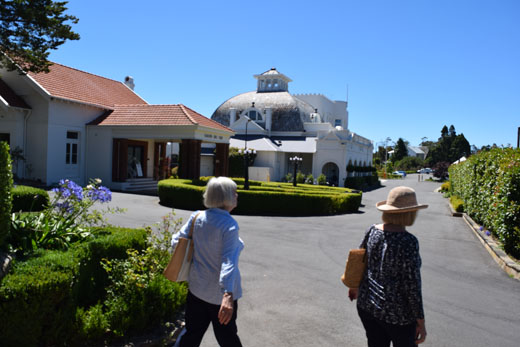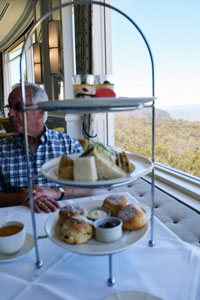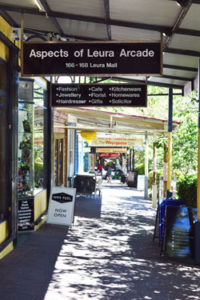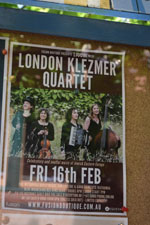
Editor’s Note: This is the fifth in a series of stories researched during Don and Nancy Harrison’s 50th Wedding Anniversary cruise from Sydney, Australia, to San Diego. Previous installments of the series, which runs every Thursday, may be found by tapping the number of the installment: 1, 2, 3, 4.
By Donald H. Harrison

MEDLOW BATH, Australia – A well-known site in Australia is the more than a century old Hydro Majestic, a kilometer-long row of hotel and dining spaces mixing Edwardian and Art Deco architecture and overlooking the Megalong Valley in the Blue Mountains National Park. Some might call it New South Wales’ answer to the Hotel del Coronado in California, except that the Hydro Majestic’s historic guest list may seem to Jewish eyes far more sinister.
Among those guests whom histories of the hotel mention was Bertha Krupp, the inheritor of Germany’s Krupp Industries, which made armaments during World War I and World War II. During the First World War, the Krupps manufactured the “Big Bertha” cannon which could lob shells a distance of 75 miles, as well as submarines which sunk Allied shipping almost at will. But even worse was the Krupp family’s complicity in the Nazi takeover of Europe and the subsequent Holocaust against the Jews during World War II. The Krupps utilized slave labor to build armaments for Adolf Hitler. Bertha’s husband, Gustav, and son Alfried, who took over the company in 1943, both were charged as war criminals, although Gustav was deemed to ill to go to trial. Gustav was a super-Nazi, who prior to the war, secretly built submarines and armaments to aid Hitler’s developing plans of world conquest. Bertha was known by Krupp employees as a kind woman, who would arrange for their care if they became sick. But that kindness did not extend to the Jews and Slavs in the Krupp labor camps. For Bertha, Jews and Slavs were nothing but “livestock.”
The Hydro Majestic reports that Bertha Krupp donated a piano to the hotel.
Australia’s first prime minister Edmund Barton not only stayed at the Hydro Majestic, he died there in 1920 after a heart attack. Australians honor him for being a prophet of federation, bringing together the various colonies in Australia as a single nation; or as he put it, “’For the first time in history, we have a nation for a continent and a continent for a nation.” Yet, he was also an advocate of the “White Australia” immigration policy, which welcomed immigrants from European countries, while banning those from Asia and the Pacific Islands. Another quote from Barton is not nearly so elegant as the one above: “The doctrine of the equality of man was never intended to apply to the equality of the Englishman and the Chinaman.” As one who is the proud grandfather of half-Taiwanese grandchildren, I take vigorous exception. In the United States, during the early 20th century, Asians also were excluded as immigrants, and through a quota system, Jewish immigration was severely restricted. The same sense of Gentile superiority prevailed in both countries.
Another honored guest was Sir Arthur Conan Doyle, best known as the creator of the fictional detective Sherlock Holmes. His relationship with Jews was not clear cut; on the one hand, he occasionally dealt in stereotypes, such as those pointed out by movie and television critic Liel Leibovitz in the September 27, 2012 edition of Tablet:
“The same afternoon,” writes Conan Doyle in A Study in Scarlet, brought “a grey-headed, seedy visitor, looking like a Jew peddler.” A notch above the author’s Jewish peddlers are his Jewish money-lenders: “He is mad keen upon winning the Derby,” Holmes informs Watson in The Adventure of Shoscombe Old Place, speaking of a proper aristocrat. “He is in the hands of the Jews, and may at any moment be sold up and his racing stables seized by his creditors.”

On the other hand, Conan Doyle came to the defense of a Jewish man wrongly convicted of murder, his book on the case helping the German-Jewish gambling den operator Oscar Slater win an appeal in the case of the bludgeoning death of an 82-year-old Scottish woman.
Adding further intrigue to the case of Sir Arthur Conan Doyle was his relationship with the Jewish magician and illusionist Harry Houdini, for whom his feelings of friendship turned into enmity after Houdini began to publicly expose as frauds various “spiritualists” in whom Doyle had placed his belief.
An attraction for any visitor to the Hydro Majestic is to enjoy high tea in the Wintergarden dining room with its commanding view of the Megalong Valley. Choices of tea are accompanied by a three-tiered silver stand bearing, at its bottom level, scones to be relished with jam or clotted cream; on the middle tier, small finger sandwiches, such as those featuring smoked salmon or egg salad; and at its top-level puddings and pastries of various descriptions. These are brought by waiters emulating the grand, early-20th -century traditions of the old hotel, and although delicious, these offerings at $55 per person prompt one to wonder whether such guests as Krupp, Barton, and Doyle might have enjoyed similar repasts, so comfortable amid their “exclusive” surroundings.


 Before we returned to Sydney, about 70 miles east, with our hosts Donna and Philip Moses, we had other sightseeing to anticipate in the Blue Mountains, so named because of chemical vapors emitted into the sky by the numerous eucalyptus trees growing all over the mountains. For example, we were to see the Three Sisters rock formation, which according to a legend of the Aborigines, was created when the sisters Meehni, Wimlah and Gunnedoo were turned into stone by an elder of their Katoomba tribe to prevent them from being carried off by enemies. The problem was that the elder, himself, was killed in the battle, so there was no one to turn them back into mortals. It’s hard not to like that story better than the one told by geologists, that the Three Sisters formation was caused by erosion.
Before we returned to Sydney, about 70 miles east, with our hosts Donna and Philip Moses, we had other sightseeing to anticipate in the Blue Mountains, so named because of chemical vapors emitted into the sky by the numerous eucalyptus trees growing all over the mountains. For example, we were to see the Three Sisters rock formation, which according to a legend of the Aborigines, was created when the sisters Meehni, Wimlah and Gunnedoo were turned into stone by an elder of their Katoomba tribe to prevent them from being carried off by enemies. The problem was that the elder, himself, was killed in the battle, so there was no one to turn them back into mortals. It’s hard not to like that story better than the one told by geologists, that the Three Sisters formation was caused by erosion.
Additionally, we would window shop in Leura, one of the larger towns in the Blue Mountains, where I was delighted to see a posted advertisement for a visiting Klezmer band from London. Pun-lover that I am, I aslo was happy to espy a store which borrowed from Christian Scriptures to call itself “Loaves and Dishes.”
*
Harrison is editor of San Diego Jewish World. He may be contacted via Donald.harrison@sdjewishworld.com
Pingback: Retirees, tourists warmly welcome in Burnie | San Diego Jewish World